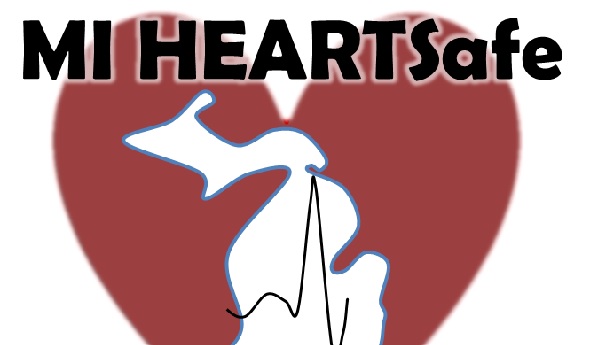
105 Schools Recognized As HEARTSafe
October 19, 2016
The Michigan Departments of Health and Human Services (MDHHS), and Education (MDE); American Heart Association (AHA); Michigan High School Athletic Association (MHSAA); and Michigan Alliance for Prevention of Sudden Cardiac Death of the Young (MAP-SCDY) have awarded 105 schools in Michigan with the MI HEARTSafe School designation which recognizes schools that are prepared to respond to cardiac emergencies.
“Many sudden cardiac deaths that claim the lives of children and young adults could be prevented through screening, detection, and treatment,” said Dr. Eden Wells, chief medical executive of MDHHS. “Appropriate medical response within three to five minutes is crucial for increasing the chance of survival, which is why I’m pleased to see so many of our schools taking vital measures to prepare and address this health issue.”
In order for a school to receive a MI HEARTSafe School designation, it must perform at least one cardiac emergency response drill per year, have a written medical emergency response plan and team, have current CPR/AED certification of at least 10 percent of staff, 100 percent of head varsity coaches, and 50 percent of P.E. staff; have accessible, properly maintained and inspected AEDs with signs identifying their location; and ensure pre-participation sports screening of all student athletes using the current physical and history form endorsed by the Michigan High School Athletic Association.
“We are so proud to support Michigan’s HEARTSafe schools,” said State Superintendent Brian Whiston. “Ensuring schools are prepared for sudden cardiac emergencies through planning, training, and life-saving AEDs is an important part of having safer learning environments for students, staff, and the community.”
Between 2003 and 2012 in Michigan, there were 2,590 young individuals between 1 and 39 years of age who died of sudden cardiac death. Of those, 214 were between 5 and 19 years of age. This is the third year of the MI HEARTSafe Schools program in Michigan. In the first two years of the initiative, 162 schools were previously designated as MI HEARTSafe Schools and prepared to help reduce the number of sudden cardiac deaths in our youth.
Public Act 12 of 2014 requires all schools (grades kindergarten to 12) to have a cardiac emergency response plan in place. This MI HEARTSafe School designation recognizes the 267 school buildings that have taken steps above and beyond to prepare to respond in the event of a cardiac emergency, and is awarded for a period of three years. Click for the list of designated schools.
Schools that meet all of the requirements will be able to apply for the MI HEARTSafe School designation each year. Click for information about the MI HEARTSafe Schools program.

Council Reaffirms Winter Sports Will Play
January 27, 2021
By Geoff Kimmerly
Second Half editor
The Representative Council of the Michigan High School Athletic Association reaffirmed its commitment today to play Winter sports when current restrictions are lifted by the Michigan Department of Health and Human Services (MDHHS).
Winter contact sports – girls and boys basketball, competitive cheer, ice hockey and wrestling – are allowed presently to participate in non-contact activities only, per an MDHHS emergency order restricting contact activity and competition due to COVID-19.
Non-contact Winter sports – girls and boys bowling, girls gymnastics, girls and boys alpine skiing and girls and boys swimming & diving – are able to participate in those activities fully.
The MDHHS limitations on Winter contact sports were set to expire at the end of January, but were extended last week by MDHHS through Feb. 21.
“Each week, we see hundreds of examples of children and families competing in non-school competition, both in-state and out-of-state,” Uyl said. “This not only is in violation of current MDHHS orders, but sending all of these families into different states will only become an impediment to getting students back in school fulltime.
“But we can contribute to students returning to in-person learning by allowing MHSAA member schools to begin full activities, participating locally and against more local competition, and under the guidance of trained, professional educators.”
This past weekend the MHSAA concluded its remaining Fall tournaments with 11-Player Football Finals. Earlier this month, Girls Volleyball, Lower Peninsula Girls Swimming & Diving and 8-Player Football Finals were competed to conclude those seasons. All four were allowed to complete their seasons because those teams took part in the MDHHS rapid testing pilot program.
Results of that program were overwhelmingly positive. A total of 5,376 individuals (athletes, coaches, team personnel, cheerleaders, etc.) were tested, and 57 – or 1 percent – tested positive at some point in the pilot. Nearly 30,000 rapid antigen tests were administered – and 99.8 percent were negative. (All four data points were through Jan. 19 and provided to the MHSAA by the MDHHS.)
As of Monday (Jan. 25), Winter contact sports had begun in 38 states, including border states Indiana, Ohio and Wisconsin.

